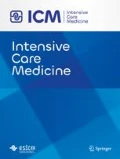Dear Editor,
Critically ill patients who survive an acute illness or disease do not always recover rapidly and may become dependent on life support and mechanical ventilation via tracheostomy. Patients can have a difficult clinical trajectory with prolonged stay in the intensive care unit (ICU) resulting in significant mental health issues such as anxiety and depression.
A 42-year-old man was admitted to our ICU requiring intubation and ventilation due to (Miller Fisher) Guillain–Barré Syndrome. A tracheostomy was performed, and he had a long respiratory wean with a total ICU length of stay of over a year. During this time, he developed signs of depression and felt locked not only in his body but within the ICU. Short trips outside the unit were organised as often as possible with a portable ventilator and monitoring. It started with a stroll down the corridor, and it progressed to the rooftop Helipad (Fig. 1). The initial anxiety of leaving the room transformed into a joyful experience which he was looking forward to daily. Leaving the bedside for a short journey is not only therapeutic and meaningful but appears to improve mental health of long-term ICU patients. This continued throughout the COVID-19 pandemic in a safe, modified way as a part of the patient’s care (Fig. 2).
Author information
Authors and Affiliations
Contributions
BF and GYS wrote the manuscript.
Corresponding author
Ethics declarations
Conflicts of interest
The authors have no conflict of interest to declare.
Informed consent
The authors declare to have informed consent of the patients to publish the images.
Additional information
Publisher's Note
Springer Nature remains neutral with regard to jurisdictional claims in published maps and institutional affiliations.
Rights and permissions
About this article
Cite this article
Fazzini, B., Sim, G.Y. Time outside for a long-term ventilated ICU patient. Intensive Care Med 47, 1167–1168 (2021). https://doi.org/10.1007/s00134-021-06496-x
Received:
Accepted:
Published:
Issue Date:
DOI: https://doi.org/10.1007/s00134-021-06496-x



